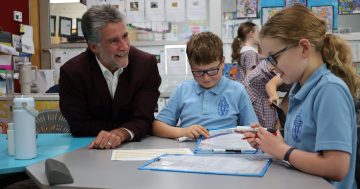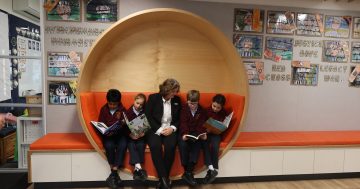
Perspective is a key attribute when one is considering the efficacy of our education systems, including our local schools, and it is time to consider the “big picture”, rather than focusing on reports that are regularly released nowadays and have kept teachers ‘on the defensive’ for many years now.
I have for some years been following Jack Waterford, a greatly respected journalist, and I can say that I am in awe of his talent! Jack’s thoroughly researched opinion pieces are always worth reading.
But Jack wrote an article last Friday in the Canberra Times, that provoked me into responding, not so much to deny any of the issues he flagged (and he made some excellent points), but rather, in the interests of a fair debate. I wanted to expose some other ideas seen through a different lens, that need to be considered in any comprehensive analysis of external reports, as the only measure of success in our schools.
Education is a multi-dimensional/multi-faceted affair. There are a plethora of measures to look at, not just performance in external examinations but there is also a need to look at the “bigger picture” – taking into account of what we ultimately want for our children’s futures. When you ask any parent what they want for their children, they will most commonly respond in terms of “happiness”. We ALL want our children to be happy. And indeed, the most common human desires on the planet, we all know, usually revolve around health, wealth, and happiness. With technological advances making us more aware that we are all “human” and live in a global community, there is an increasing, welcomed additional focus (thankfully), on philanthropy and being community-minded. So we want our children to be good citizens too, and contribute to society in meaningful ways.
Someone wise once told me that you can judge a society by the way they treat their weakest and most vulnerable.
In short, though, it has to be about balance.
Balance and mental health
I’ve just been reading up about what the scientific community call “entropy”, which is a very interesting concept, and in its simplest terms (I am a simple soul), as I understand it, it’s that things naturally go ‘pear shaped’ more often than not in our lives. In other words, life turns to chaos quite frequently, in the Murphy’s Law kind of way, unless we do something about it. (Remember the phrase: “Life wasn’t meant to be easy.”)
Indeed, if you reflect on the times that you have been most unhappy, it is when your life has become out of kilter in some way – maybe divorce, problems at work, trouble with work/life balance, financial trouble, and so on… when you felt your life was in a dark place. But the good news is that a successful life is one that has been designed, planned, and prepared, specifically to prevent chaos and launch you on the right path toward leading a successful life. Yet, we have more and more dysfunctional families, an increasingly alarming mental health epidemic and climbing suicide rates. We must be doing something wrong as a society when so many of us feel stressed out and feel as if we have a lack of control – which brings on that sense of hopelessness that can be most dangerous. And this is something that warrants our attention. We need to build resilience.
Leo Tolstoy writes in Anna Karenina, “Happy families are all alike; every unhappy family is unhappy in its own way.” Which leads me to suggest that today we have more and more stress on our families, and life is not as simple as it once was when I went to school. In my day, teachers had to teach the basics, yes. But largely, it was the family’s role to love and to socialise their children, inculcating the values that are necessary for developing a fully functioning member of society. Today, teachers are ever increasingly having to do the family’s job and provide stability for more and more students who come from dysfunctional families for an infinite variety of reasons. Today, teachers are also having to prepare students for jobs that don’t yet exist in an ever-increasingly complex world. Today, teachers are accountable more than ever before and yes, it’s become a situation where they are constantly on the defensive and they shouldn’t have to be.
Today, teachers are ever increasingly having to do the family’s job and provide stability for more and more students who come from dysfunctional families for an infinite variety of reasons. Today, teachers are also having to prepare students for jobs that don’t yet exist in an ever-increasingly complex world. Today, teachers are accountable more than ever before and yes, it’s become a situation where they are constantly on the defensive and they shouldn’t have to be.
For our children to achieve health, wealth, and happiness and to nurture the leaders of tomorrow, we need to look once more at that big picture.
Teacher quality
According to the research (and widely acknowledged in education circles), the teacher is the most effective APP on the planet! Yes, it is teacher quality that makes the biggest difference to educational outcomes. If we look at the Finnish system of education (which is held up and revered as a model for successful educational outcomes), the biggest, notable difference between their system and ours is that teaching is a revered profession (i.e. they apparently don’t engage in teacher bashing there), and they have achieved this largely because the status of the teaching profession has been raised to where it should be. All teachers are required to have Masters degrees, they are compensated in line with other high paying professionals, like doctors, lawyers, and IT professionals, and it is also highly competitive to get into. What’s more, there is little testing and the focus is on the fun of learning. See more here: “In Finland, teachers are the most trusted and admired professionals next to doctors, in part because they are required to have a master’s degree in education with specialisation in research and classroom practice.”
It is also very useful to look at some of the research on happiness and its connection to education.
Research on creating happy kids
Firstly from psychology. Mihaly Csikszentmihalyi, a Hungarian psychologist in the US, whose much-respected research and resulting theories on happiness conclude that most people can achieve happiness with an increase in experiences of “flow”. (Check out his TedTalk here.)
According to Csikszentmihalyi: “Flow is the most optimal of these states for learning, as it is where skill level and challenge level of a task are at their highest. This creates an opportunity for learning and intense focus, where learners can even feel that they lose track of time because they are so immersed in the task.
In contrast, a learner can experience relaxation in learning a task when their skill level is very high and the task challenge is very low. Conversely, a learner can experience anxiety when their skill level is very low and the task challenge is very high. Neither state is supportive of optimal learning.”
Developmental psychology also indicates that our children need safety, stability, structure, and simplicity. Maslow’s hierarchy of needs is still very relevant today, and is no doubt still taught in teacher training institutes everywhere.
By way of anecdote, I was a teacher a lifetime ago, and remember when Maslow’s theory hit home for me. I was teaching in Canberra in a very challenging school, in terms of the socio-economic status of its clientele and had a child who was already streetwise at the tender age of 7. He had repeated year 1 twice. His very young mother (who was but a child herself and constantly in crisis), would drop him off at my classroom doorstep screaming at him, that he was no good and would end up just like his father, in jail. She would often announce that she would not be picking him up – and she carried it out more often than not. We had to drive around looking for her to drop the child off, and of course, welfare was frequently involved. That child was more concerned about when his next meal would be and where he would be sleeping that night. For him, the best I could do was to provide him with a safe and secure environment, some love and attention, and to work on his self-esteem, before I could teach him anything related to basic skills.
With an increasing number of families in crisis, the challenges of the classroom teacher today are phenomenal and the support they get could be increased in terms of professional development and gaining strategies to fully engage students who are falling through the system, either at the tope end, or the bottom end.
Balance and the big picture
Nevertheless, turning to more positive aspects, we should also be making learning fun, and less stressful. Even the measurement tools like NAPLAN (which without a doubt is a most useful diagnostic tool), should be viewed as an exciting challenge, rather than something stressful. We have enough stress in our lives, don’t we? Many adults lead very stressful lives and surely, we don’t want to pass this down to our children? In fact, the role of the educator has changed dramatically over the decades. In my time, the teacher was the fountain of all knowledge. But today, the internet has replaced that function. What technology can’t replace is the contagious love of life-long learning that only a passionate teacher can provide. It’s our role to give that gift to our students, to make them independent curious life-long learners, discovering and following their passions so that they can experience “flow” in their lives.
Coming back to Canberra and our local schools, it is a fact that many of the schools are already taking their role seriously, and doing as much as they can to make improvements following on the reports that are released. I wrote about a few in a previous article: Celebrating our schools. And I intend to write more to balance the “teacher bashing” that is a constant in our media-driven lives, where everyone who ever went to school is an expert on education. It’s complex and complicated, the question of how best to educate our children for the 21st Century. And, Jack is right, in that we do need to avoid being complacent and look more at big picture changes. Innovation in education should be at the forefront of our practice. We are living in a world where one size no longer fits all, and to keep up with rapid change is a challenge to us all. But I say, that our education system, and our schools need to have more autonomy in creating better outcomes for our students, as they are at the coalface and they are the experts!
While we are at it, let’s work on raising their status and getting the best teachers we can into our system. Just like Finland!
From my observations, and 20+ years in classrooms, the majority of teachers are dedicated to making a difference – the only question that remains is, what support can we give them in terms of professional development? School leaders should be the experts in their field and perhaps need to be trusted to make the right decisions for their students and for the outcomes we want for our children.
Finally, I’ll bet that somewhere out there, there are many of you, who have had incredible learning experiences with a teacher who made a difference in your lives. We’d love to hear from you. Let us know about them and let’s celebrate teaching and what is being achieved, instead of just criticising.
It’s all a question of balance, after all is said and done.




















